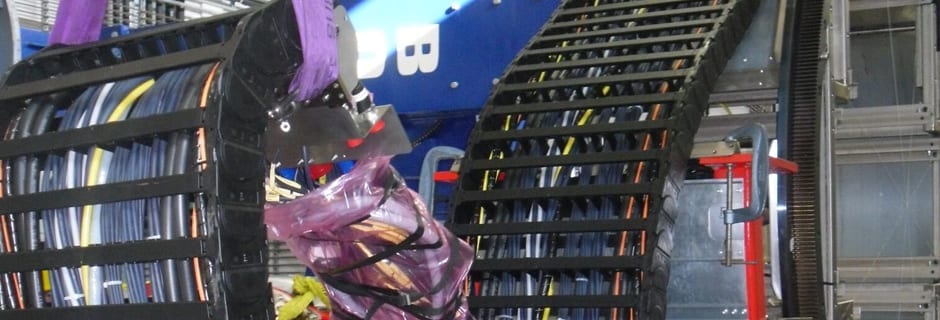An expanded test laboratory has enabled igus to carry out cable tests at extreme temperatures under real conditions
[title size=”4″]Solving the UK’s productivity puzzle will demand greater adoption of automation technologies[/title]

Above: Managing director Matthew Aldridge announces the official opening of igus’ expanded engineering support facility
According to the latest Investment Monitor 2017/18 from manufacturing industry organisation the EEF, the UK is spending significantly less on machinery and equipment than its major European counterparts, many of which are ahead of us in terms of productivity. The UK, for example, uses only 71 robots per 10,000 employees, compared with 301 in Germany. Explanations for this include perceptions of prohibitive costs, economic uncertainty and a shortage of the requisite skills and understanding to fully embrace automation on the factory floor. Respondents to the EEF’s research on the barriers to automation cited the following as among the biggest challenges: lack of appropriate skills; rigidities within business; and concern about damaging relations with the existing workforce. Headlines in 2017 suggesting 1.2 million manufacturing jobs could be put at risk by robots are unhelpful in strengthening relationships between employers and employees.
The role of people in supporting, enabling and implementing automation is often overlooked but it is crucial that employees are fully engaged in the journey towards new ways of working. This is not only because human endeavour is essential to propagating automation but, also, because automation frees people from repetitive, mundane and low-value tasks, allowing them to add value in areas of the business where they can truly make a difference – such as innovation, problem-solving, development of bespoke solutions, customer service and marketing.
“I will always argue that, instead of taking jobs, automation creates jobs, and history demonstrates that to be the case,” says Matthew Aldridge, managing director of igus, the specialist manufacturer of high-tech plastic components including bearings and chains, which enable the movement of mechanisms in numerous industries from robotics and automotive to theme parks and theatres. The Northampton-based company, which employs 110 people, is known not only for its commitment to lean principles and efficiency, but also for the high value it places upon its workforce, evidenced by a number of initiatives designed to promote employee engagement. It is a combination that has been rightly rewarded with successive years of double digit growth.

Guests at the official opening of igus’ newly expanded engineering support facility
Having celebrated its 25th anniversary in 2016, igus invested in a major expansion of its engineering support facility in 2017. This was a response to growing demand for customised sub-assemblies that are configured in advance, to enable simple and fast deployment at the premises of end users. The expansion of the igus site provides more space in which to serve that demand and opens up scope for the further recruitment that is expected if current levels of business growth continue. At the official opening in October, Matthew Aldridge paid tribute to the enthusiasm of the workforce, whose influence on the business is tangible.
The new upper floor follows the same design principles as the established ground floor, being fully open-plan in its layout. Walls are scrupulously avoided as far as possible and, where they cannot be eliminated, they are constructed from glass. Desks are identical, whether occupied by a business director or a telesales executive, and the workspace is shared equally. This is not an aesthetic flourish but a very deliberate effort to encourage a sense of unity and sharing of ideas, while signifying the absence of conventional hierarchy. It is the physical embodiment of igus’ “solar system” principle, which places customers at the centre of all activities and empowers all departments to interact with them evenly.

“People must be central to all you do”. The assembly of customised energy chains by igus’ workforce has been a significant source of growth
Putting these principles into everyday practice, igus runs daily “ijam” meetings, which enable the entire team to share problems, questions and ideas. Free breakfasts and lunches are provided in the canteen, which facilitates interaction between team members who may ordinarily work in separate areas. Employees are actively encouraged to take responsibility for customer experience and make suggestions for improvements in processes.
“The results of this people-centric approach have been very positive,” says Matthew. “Our business growth speaks for itself. The point is that, while a certain amount of automation can make a big difference to productivity and cost control, people must be central to everything you do, whether assisting in the journey to automation or redeployed in higher value roles. If you can unleash their potential in this way, the opportunities are huge.”

